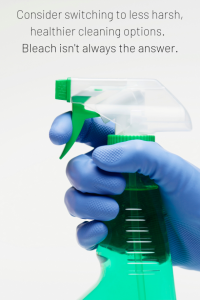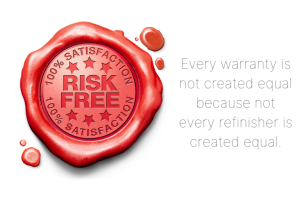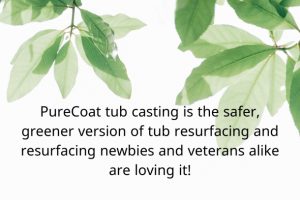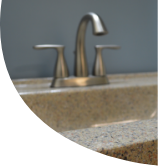5 Things We Wish We Knew Before Having Our Tub Resurfaced
Having your bathtub resurfaced can be a big, and sometimes costly, decision. Unfortunately, in this day and age it is naive to assume your home improvement professional is providing you with all the info you may need during the estimate process to make an educated buying decision. And the burden of research oftentimes falls upon the homeowner. But let’s be real, arming yourself with information is without a doubt your best defense when it comes to getting the most for your money.
Keeping with good business practice there are certain things Custom Tub & Tile will review with all of their customers prior to scheduling. Taking into consideration the customers’ familiarity with resurfacing, of course. But the information conveyed is more often than not things someone who is generally unfamiliar with tub refinishing should know prior to signing off on the work. Just so they fully understand what they’re getting into before jumping in with both feet. Let’s explore some of the high points of these aforementioned conversations.
Recommended Cleaners

A refinished tub requires specific cleaners to help the finish last. These are generally non-abrasive, grease-cutting soaps that gently cleanse without damaging the surface. As mentioned in previous blogs, there is no cleaning product on the planet that will cause the coating on a resurfaced tub to peel/chip/flake; however, it can cause discoloration and staining. That is why bleach and products containing bleach are absolutely not allowed anywhere near the resurfaced tub. But don’t let that deter you! Once the tub is resurfaced it is covered in a non-porous coating which is a lot easier to clean because it doesn’t trap dirt. Because of this bleach is no longer necessary and it may be time to consider switching to a less harsh, healthier cleaning option. Bleach isn’t always the answer. To access our list of recommended cleaners click the link below…
Custom Tub & Tile’s Recommended Cleaners
What to Expect
It should go without saying that knowing what to expect before, during, and after the tub refinishing process is crucial. Because there is nothing worse than feeling unprepared for a service when you’re paying hundreds, if not thousands, of dollars for. Knowing things like: How long will the job take? Is it smelly? What chemicals do you use and are they harmful? Where should resurfacing fit into my remodeling timeline? Are all very important questions to ask as the answers are instrumental in preparing you for your service call. And any seasoned refinishing company should be able to answer all of these questions and more so you can prepare accordingly. They should also be managing your exceptions about what resurfacing can fix and can’t fix (because it is primarily a cosmetic fix) that way you can decide if resurfacing is the right fit for you. Not sure what questions you should be asking your finishing professional? Click the links below…
What to (Actually) Expect When Planning A Professional Refinish
6 Questions You Should Ask Your Bathtub Refinishing Professional
6 Things to Look For When Hiring a Bathtub Resurfacing Company
What is Covered Under the Warranty

Every company has a different warranty, some cover circumstances and situations that other companies do not. And every warranty is not created equal because not every refinisher is created equal. Be sure to ask your refinishing professional how long their warranty is good for and what it specifically covers. And how long they’ve been in business. A big red flag is when the company hasn’t even been in business for as long as their warranty is. It is also important to mention that not all tub refinishing warranties are transferrable. Meaning, if you sell your home the warranty does not transfer to the new owner. And it is always better to find out this information prior to scheduling an appointment. And most companies can even send you a copy of their warranty ahead of time so try to factor this information in when you’re getting an initial estimate! For more info on warranties check out the blog link below…
How Long Does Resurfacing Last?
The Chemicals Used
Not all tub resurfacing professionals use the same (and safe) products. Out of all the high points we’ve discussed you’ll definitely want to do your homework here as it is ultimately your responsibility to determine what you will and will not allow in your home. To make a loooong story short: methylene chloride and isocyanates are DANGEROUS! Sure, they create a beautiful gloss and that’s why refinishers love them but the payoff is absolutely not worth the risk. For the sake of your safety and health locate a company that does not use these chemicals or better yet, has an odorless process. To find out more info on the dangerous chemicals that can be used during tub refinishing click the link below…
Why You Should Be Concerned For Your Health: The Dangers of Tub Resurfacing
A Better Option?

Believe it or not there is a better, safer option currently on the market. We mentioned an odorless process earlier, and it’s true! PureCoat tub casting is the safer, greener version of tub resurfacing, and tub resurfacing newbies and veterans alike are loving it. Essentially it is a synthetic porcelain resin that is poured onto the tub creating a permanent coating that looks and feels like a brand new tub. Most people who suffer from asthma or allergies opt for this luxury service as is provides maximum comfort. If you feel like tub resurfacing just doesn’t fit your lifestyle ask your refinishing professional about their bathtub casting options! For more information on casting check out these blogs…
The Evolution of Tub Refinishing
Tub Casting: Tub Resurfacing’s Cooler Younger Brother


